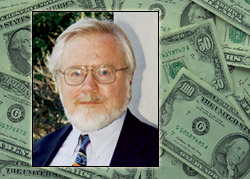Professor’s Research Traces Accounting Scandal to the Pilgrims
by Bill Gerdes

Auditing is much in the news these days, with Enron, WorldCom and other corporate scandals dominating the business pages. But auditing almost literally came with the founding of the country, according to research done by Dr. William Samson, Roddy-Garner Professor of Accounting in the Culverhouse College of Commerce and Business Administration and former president of the The Academy of Accounting Historians.
According to Samson, the Pilgrims’ story from a business history side had an accounting scandal that was the ancestor of Enron and Tyco. Samson said the Pilgrims sought financing and a charter to settle in America that were supplied by a group of early venture capitalists. The details of the agreement were unclear and no bookkeeper accompanied the group to America. A business manager sent to America by the financiers to run the business returned to England and borrowed money on behalf of the Pilgrims, and then spent it on travel, gifts and a London pub. The same individual returned to Massachusetts and opened a trading post in competition with the Pilgrims, and his own enterprise always made more money than the one he managed for them. An auditor sent from England to look at the books found nothing wrong and, in fact, went into business with the business manager. Miles Standish finally solved the problems, and accounting was then included with reading and writing in the first school in Massachusetts.
According to Samson, colonization efforts—Sir Walter Raleigh’s “lost” colony in North Carolina, the Jamestown colony, the Pilgrims’ colony and the Puritans’ colony in Massachusetts—were all done as “joint-stock” ventures with wealthy capitalists in London financing the colonial efforts.
“In putting up capital and entrusting assets to colonists who would be overseas literally thousands of miles and out of the control of the capitalists, the London financiers employed auditors to check the correctness of the records kept by the company officials in the New World. The Massachusetts Bay Company—the Puritans—employed eight auditors, for example,” Samson said.
The auditing controls that English governments used to control their officials were adopted by American colonial governments and its towns.
The practices of governmental auditing in the colonies became the basis of the practice of the new nation. George Washington’s request for reimbursement of his wartime, out-of-pocket expenses, for example, was carefully scrutinized by James Milligan. Washington kept such good records of his expenses for the eight years in office that the request, upon audit by James Milligan, was only off a dollar, and the adjusted amount was approved, Samson found.
Auditing in private businesses was not as necessary as in government during the Colonial period because these businesses were small and the owners managed the enterprises, so that the separation of the provision of capital and the control over assets did not often occur. But when businesses grew large and outside capital was needed, auditing developed in private organizations. Thus the Potomac (Canal) Company in 1786 had auditors elected by shareholders to look at the treasurer’s records. This practice continued with its successor company, the Chesapeake and Ohio Canal Company, in the 1820s.
Research shows the audit committee of the board of directors was used to audit the treasurer’s accounts at the Baltimore and Ohio Railroad from its inception in 1827. The audit need arose due to the huge outside financing it took to build the railroad, which was entrusted to managers, Samson said.
“This uncovering of the early auditing activity that arose in the U.S. pushes our understanding of auditing history back in time several decades, if not centuries,” Samson said. “The common belief is that auditing in the U.S. began in the late 19th century when British auditors were sent to the U.S. by British investors. The auditors sent did have a major impact on the start of the public accounting profession developing here, but auditing in the U.S. certainly predated the arrival of these ‘independent’ accountants who helped develop the public accounting firms around the turn of the century. Thus auditing in America has a history from the country’s founding.”
Audit history research is relevant to today’s crises in auditing and audit failures by the large public accounting firms because it reflects two important ideas, Samson pointed out. “First, fraud prevention and detection has always been the reason to audit, whether it was [for] government officials, leaders of colonies or officers of the early Baltimore & Ohio Railroad. Thus, the notion that modern auditors are not auditing for fraud and have little responsibility for fraud detection certainly flies in the face of the historical reason for an audit.
“Second, there seems to be no misunderstanding of the auditor’s adversarial role in conducting audits throughout history. The auditor historically examined the records of the official being audited for the assurance of the providers of the funds, whether citizen-taxpayers or investors.
“Today, CPA firms refer to the enterprise being audited as ‘the client’ and don’t see the audit as being adversarial, but often as a means to help management and the audited company. From the historical perspective of capitalists having an audit conducted, ‘the client’ in the modern audit should be the investors, whom the auditor should be working for, rather than the client being the organization being audited. Changing the view of who is ‘the client’ would change the orientation of the auditor in conducting an audit to a more adversarial examination and there would be fewer surprises that management [had] lied to the auditor.”